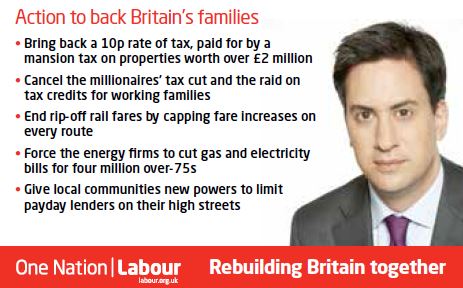Labour’s 2014 National Policy Forum took place the weekend of the 20th July. Its role is to agree a programme document which will be put to Conference in September. From this will be drawn the manifesto, and the pledge cards. This’ll be the last NPF before the election. There has been a lot of comment in the press, and this article looks at some of that from what should be our friends, and looks a bit less from some of those present, but I look at what I found. The Guardian promises the revised programme will be published in time for Labour’s Conference but recent history suggests not in time for a mandate to be established.
Ed Miliband open the conference with his “Big Reform not big spending” speech, the full text is here, It was also reported by the New Statesman, in an article, called “Miliband defines his programme: big reforms, not big spending”, one section of the article says,
…promised to significantly increase the minimum wage, to end “exploitative” zero-hours contracts, to freeze energy prices, to cap rent increases, to devolve £30bn of funding to city regions (a dramatic break with Labour’s centralising tendencies), to create two new “challenger” banks and to introduce worker representation on remuneration committees – radical proposals that do not cost government money.
which gives us hope but as the conference closed even Labour’s friends in the Press focused on the one vote held which was on the need, or otherwise, for an emergency budget. The significance of the issue is two fold. One difference should be that Socialists and Keynesians believe that the British economy is suffering from a lack of demand; the second is more technical in that the Government financial year is March to March and there will be a budget in place by the time of the General Election. Unless there is an emergency budget, the first 10 months of a Labour Government’s taxation and expenditure will be based on the last ConDem Budget. Why would we want to agree to this? Oddly, we voted not to have an emergency budget. Jon Lansman tells the story at Left Futures, making the point that the consensus is based on coercion and that the role played by the elected members of the NPF is less than that of the shadow front bench or their special advisors, many of whom are chosen for their press and presentation skills rather than their policy expertise.
The Guardian reports the meeting in an article, “Labour leaders win crucial policy forum vote on spending plans” which might have come from Ed Balls press office, although it too catalogues the “free” regulatory reforms in the energy, rail and banking sectors. These it would seem are sufficient for Jon Cruddas to be quoted as saying the NPF was a success and a move away from New Labour Keynesianism. Personally I find it incredible that we wouldn’t have an emergency budget if we felt that the ConDem pre-election budget which is likely to be the most populist of the parliament were to (say) abolish the 45% tax rate on income above £150,000. The Tories did an emergency budget in 2010, they did so before the 2009/10 books were closed and used it to reinforce the story stupidly started by Liam Byrne that we’d run out of money. An emergency budget is a political story and we should not have thrown the opportunity away. Those who chose to have a showdown at the NPF know this but the issue was not whether to have a budget, but whether austerity works, Austerity is not the answer to the deficit and every time we pretend it is we give people a reason for voting Tory. Voters have a choice on both policy and on conviction. There are innumerable times when the choices seem negligible that voters will choose conviction (or abstention). Cynically denying voters a choice weakens democracy…. The cynicism of the presentation is shown by the fact that it’s all about spending, not about the deficit. During the last election Labour argued that the deficit should be closed primarily through higher taxation, and while we have stated that we will introduce wealth taxes and increase the highest marginal rates of income tax, the leadership spun the NPF vote as a vote for responsible spending and a victory for the leadership against the left in the party; a retread of the New Labour playbook in the 1990’s, nearly 20 years ago, unnecessary then and wrong today.
The New Statesman was obviously conflicted, as it reported the conference with a headline , “Labour defeats rebellion over spending plans”, although the article points out that Labour’s definition of the current account deficit is different, and more generous in the way it treats capital spending and that having the same limits does not mean that there will be the same the priorities, setting the expectations that some (many?) policies will be reversed within the expenditure limits set by the Tories. They also point out that these limits are only for the first (financial) year.
So, as ever, one has to read the detail; one can argue that its not a lot of difference but if not, why go to the line. There’s an economics shaped hole in Labour’s programme. The programme and process is seen in the light shone by the press and the press on the whole do not want Labour to win. This is why it’s important that our delegates report back. Unless the Party talks to its members, they get their news from our enemies. The report back has been poor. The revised programme is promised at the end of August and will probably be circulated to conference delegates only.
The three reports I have found and read come from Ann Black, Johanna Baxter and Alice Perry. Black’s is a good personal report, detailing motions she took to the NPF, and the, on the whole failure to get them carried, this includes a report on the debate on Trident replacement, the result of which is considered by an anonymous shadow cabinet source as the most strongly pro- nuclear deterrent position ever taken by the Labour Party. According to Black, there were 44 motions from CLPs taking a contrary position. However, Alice Perry also reports on the good she saw coming from the NPF; she says that removing the local authority borrowing cap on housing revenue accounts is now Party policy. This would be great if true. She mentions a TTIP commitment on ISDS which would be great if true. Johanna Baxter talks about her part in reversing the Employment Tribunal’s deposit scheme and reaffirming Labour’s support for low cost arbitration for press abuse. Ann Black talks about a positive position on student finance but this is not mentioned in Perry’s report, nor in David Pavett’s reports at Left Futures, where he reports on the future role of local authorities which is now to be confused by Blunkett’s proposed District Commissioners and on a series of issues, the 11+, faith schools, Ofstead, he also suggests that Labour will cap top up tuition fees and end some of Gove’s more idiotic governance schemes, although they won’t be rolled back. Pavett is clearly another visitor and had to shoulder surf to get much of his insight.
So dreadful on fiscal policy, a poor result on Trident, a lack of clarity on Housing, Education focused on governance, nothing on privacy and copyright but we will run some more e-voting trials; leading to one person one vote and that person is Mark Zuckerburg.
ooOOOoo
Again, this took too long to write, but I have a full time job, I originally wrote something longer but turned it into reportage and published in September. I have backdated this to the date it occurred.

